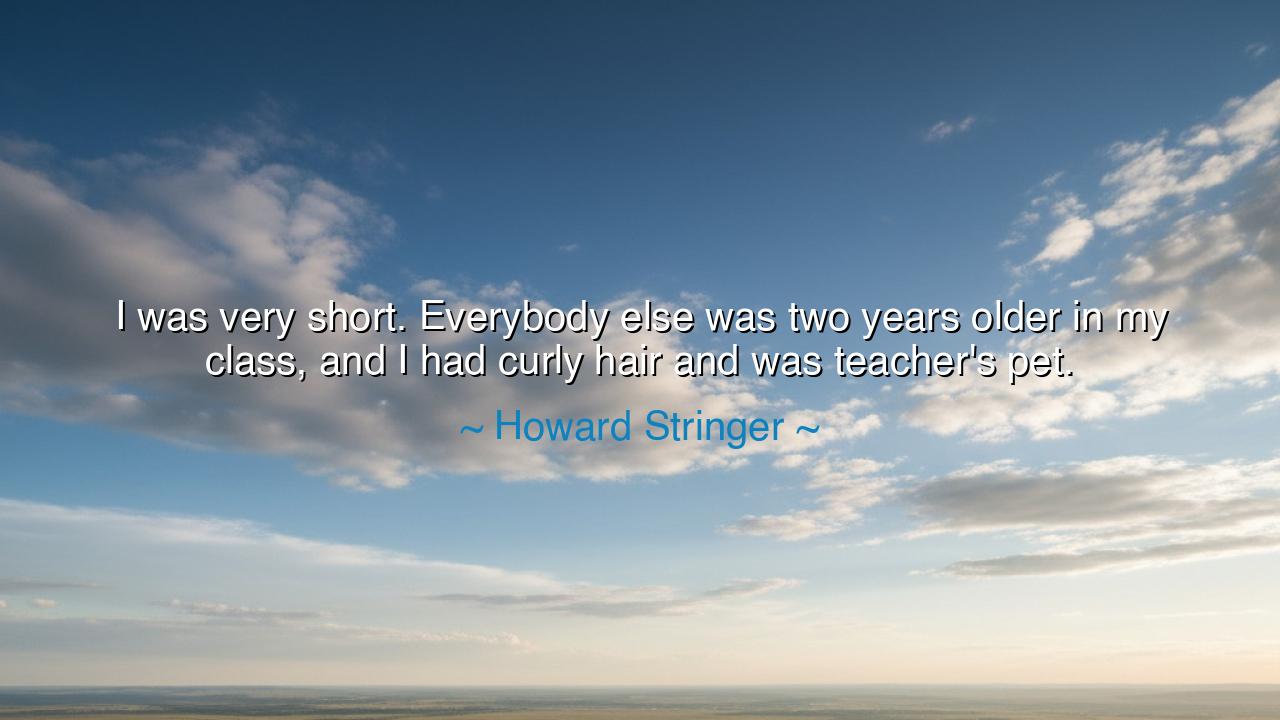
I was very short. Everybody else was two years older in my
I was very short. Everybody else was two years older in my class, and I had curly hair and was teacher's pet.






Listen, O seekers of truth, to the humble words of Howard Stringer, who spoke of his youth with candor: “I was very short. Everybody else was two years older in my class, and I had curly hair and was teacher’s pet.” In this simple remembrance lies a mirror for all who have felt small among giants, out of step with their peers, marked by some feature that made them stand apart. His words are not only confession but also testament—testament to the shaping power of difference, and the resilience born from being the one who does not fit the mold.
To be short among the tall is to see the world from beneath the shadows of others. To be younger while others stride ahead is to feel the chasm of experience press upon the spirit. To be marked by appearance, whether by curly hair or another trait, is to be reminded daily of one’s uniqueness. And to be the teacher’s pet, favored yet envied, is to dwell in that paradox where affection from authority is a crown, but among peers it may weigh as a chain. In these few words, Stringer reveals the eternal challenge of the outsider—the soul who belongs, and yet does not.
Recall, children of wisdom, the story of Socrates, who was mocked for his appearance, called ugly by his fellow Athenians. Yet within him burned the fire of inquiry, a spirit that would reshape philosophy for all time. He too was an outsider, unadorned by the gifts of beauty or stature, and yet his difference became his power. For it was not his face that made him immortal, but his relentless pursuit of truth. Even as Stringer, burdened with his youthful differences, learned endurance, so did Socrates wield his peculiarities into strength.
What Stringer teaches us is this: difference is not weakness, but the forge of character. When others are older, taller, stronger, the one who feels lesser learns to sharpen subtler tools—wit, endurance, humility, or daring. When marked by physical features that invite notice, one may learn self-acceptance and the art of turning vulnerability into charm. When elevated by a teacher’s praise, even at the cost of peers’ envy, one may learn that favor brings responsibility, and that praise can guide the heart to greater striving.
Let us not despise these small beginnings. For David, the shepherd boy, was slight compared to his brothers, yet it was he who faced Goliath with a sling and won. His stature was small, his years fewer, his weapons humble—but his heart was vast. It was precisely his difference that prepared him for greatness. So too, those who are counted as “less” by the world often rise with a strength born from long laboring under burden.
Therefore, O children of the future, do not curse your differences. Do not despair if you are short, or if you are younger, or if you feel out of place. Do not recoil if others whisper about your appearance, or if the praise of authority makes you a target of scorn. These things, though heavy in youth, are the chisels of destiny. They shape the soul into one who is resilient, creative, and ready to bear the trials of life.
The lesson is plain: what seems to set you apart in childhood may become the very thing that arms you for triumph in adulthood. Thus, embrace your uniqueness as you would a sacred mantle. Stand firm when mocked, endure when overlooked, and let the favor of those who see your worth guide you, rather than isolate you.
Practical counsel I give: keep faith in your own path. Write down your struggles, so you may see in years to come how they trained you. Cultivate skills that grow in the shadows—patience, kindness, determination—so that when the sun of opportunity rises, you are ready. And above all, never shrink from the truth that your difference is your strength. For even the smallest stone, in the hand of the prepared, can strike down giants.






AAdministratorAdministrator
Welcome, honored guests. Please leave a comment, we will respond soon